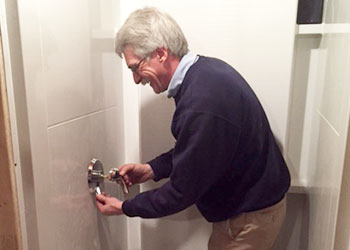 The average water heater lasts for about 10-15 years, and when it fails, you can be left with a mess. A Mansfield, CT customer had this unfortunate experience.
The average water heater lasts for about 10-15 years, and when it fails, you can be left with a mess. A Mansfield, CT customer had this unfortunate experience.
The U.S. Department of Energy has put together a fantastic infographic to help you choose a water heater. Water heating is the second largest expense in your home, with 64 gallons being used by the average household each day. This means that $400-600 is being spent annually by the average household!
There are 5 types of water heaters: storage, tankless, heat pump, solar, and tankless coil & indirect. The life expectancy varies from 10 - 20 years depending on the type. The pros and cons of the different types include high efficiency vs. need for back up system.
If you have more than one type of fuel source available to you, it is important to weigh your options. They include: electrical, fuel oil, geothermal energy, natural gas, propane, and solar energy.
Click on the infographic image at the bottom of this post for more information on the advantages and disadvantages of each type of water heater and the different types of fuel sources.
Consult your tax advisor about tax credits and rebates that you may be eligible for. You could save 30% of the cost of a solar water heater [including installation and labor costs!] through a federal tax credit that is good until December 2016. There is also a $300 federal tax credit available for installing a heat pump water heater. There is a savings of up to $300 available on gas, oil and propane storage and tankless water heaters.
Infographic - please click on the image below for more great information on how to choose a water heater:
























